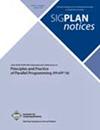自动信号放置的符号推理
Q1 Computer Science
引用次数: 4
摘要
线程之间的显式信号是并发程序中bug的长期原因。虽然有几种运行时技术可以在某些共享资源可用时自动通知线程,但由于它们的运行时开销,这些技术并没有被广泛采用。本文提出了一种基于静态分析的方法,从相应的隐式信号实现自动生成高性能的显式信号程序。关键思想是生成验证条件,使我们能够最小化所需信号和不必要的上下文切换的数量,同时保证源程序和目标程序之间的语义等价。我们在一个名为Expresso的工具中实现了我们的方法,并在以前的论文和开源软件的挑战性基准上对其进行了评估。expresso生成的代码明显优于过去的自动信号机制(平均加速1.56倍),并且与手动优化的显式信号代码的性能非常接近。本文章由计算机程序翻译,如有差异,请以英文原文为准。
Symbolic reasoning for automatic signal placement
Explicit signaling between threads is a perennial cause of bugs in concurrent programs. While there are several run-time techniques to automatically notify threads upon the availability of some shared resource, such techniques are not widely-adopted due to their run-time overhead. This paper proposes a new solution based on static analysis for automatically generating a performant explicit-signal program from its corresponding implicit-signal implementation. The key idea is to generate verification conditions that allow us to minimize the number of required signals and unnecessary context switches, while guaranteeing semantic equivalence between the source and target programs. We have implemented our method in a tool called Expresso and evaluate it on challenging benchmarks from prior papers and open-source software. Expresso-generated code significantly outperforms past automatic signaling mechanisms (avg. 1.56x speedup) and closely matches the performance of hand-optimized explicit-signal code.
求助全文
通过发布文献求助,成功后即可免费获取论文全文。
去求助
来源期刊

ACM Sigplan Notices
工程技术-计算机:软件工程
CiteScore
4.90
自引率
0.00%
发文量
0
审稿时长
2-4 weeks
期刊介绍:
The ACM Special Interest Group on Programming Languages explores programming language concepts and tools, focusing on design, implementation, practice, and theory. Its members are programming language developers, educators, implementers, researchers, theoreticians, and users. SIGPLAN sponsors several major annual conferences, including the Symposium on Principles of Programming Languages (POPL), the Symposium on Principles and Practice of Parallel Programming (PPoPP), the Conference on Programming Language Design and Implementation (PLDI), the International Conference on Functional Programming (ICFP), the International Conference on Object-Oriented Programming, Systems, Languages, and Applications (OOPSLA), as well as more than a dozen other events of either smaller size or in-cooperation with other SIGs. The monthly "ACM SIGPLAN Notices" publishes proceedings of selected sponsored events and an annual report on SIGPLAN activities. Members receive discounts on conference registrations and free access to ACM SIGPLAN publications in the ACM Digital Library. SIGPLAN recognizes significant research and service contributions of individuals with a variety of awards, supports current members through the Professional Activities Committee, and encourages future programming language enthusiasts with frequent Programming Languages Mentoring Workshops (PLMW).
 求助内容:
求助内容: 应助结果提醒方式:
应助结果提醒方式:


